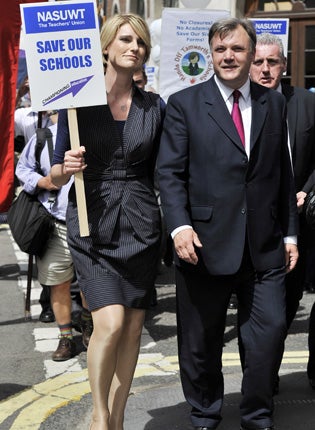Tories use terror laws to rush Academies Bill through House

Education secretary Michael Gove faced heavy criticism yesterday by both Labour and a senior Tory MP for using Parliamentary procedures normally reserved for emergency counter-terror laws to rush through legislation to create more academy schools.
The bill, which also paves the way for the Tories' flagship "free schools" policy, is being pushed through the Commons before next week's summer recess to ensure that secondary, primary and special schools who have been invited to apply to become academies – giving them greater autonomy – can obtain the new status before September.
But the use of a Parliamentary timetable normally reserved for emergency legislation in areas such as terrorism was attacked by shadow Education Secretary Ed Balls, who claimed the Academies Bill was being "railroaded" on to the statute book to avoid proper scrutiny. Mr Balls warned the changes, which could significantly increase the number of schools allowed to opt out of local authority control after 1,500 already expressed an interest in such a move, would create an "unfair, two-tier" education system.
Labour was joined in its criticism of the fast-track legislative process by Graham Stuart, the Conservative chairman of the education select committee. Mr Graham said he backed the changes but questioned the speed of the reforms, saying: "It would be a great shame if something so potentially beneficial were damaged or discredited by over-hasty execution... Parliamentary scrutiny is necessary and beneficial for any policy. It shouldn't be rushed and when it is, as the last administration found, the errors usually rebound on the Government which put it through."
Mr Gove, who has endured a rocky introduction to office after the botched announcement of swingeing cuts to the £55bn schools building programme, hit back at his Opposition critics by saying he was building on reforms introduced by Tony Blair.
Defending the Bill, the Education Secretary said: "It grants greater autonomy to individual schools, it gives more freedom to teachers and it injects a new level of dynamism into a programme that has been proven to raise standards for children, and the disadvantaged most of all."
Schools rated by Ofsted as "outstanding" will be pre-approved by the Department of Education to become academies as early as this September, although questions remain about how many will be ready. Mr Stuart suggested that as few as 50 schools might be in a position to take up the new status by the start of the next academic year.
Stephen Twigg, the former Labour schools minister, said that rather than targeting the academies programme at under-performing schools in disadvantaged areas as had happened under the previous government, Mr Gove was giving "first priority to outstanding schools which are disproportionately in areas of affluence and advantage".
Mr Gove, who described himself as a "born-again Blairite" because the former prime minister had made it clear he wanted every school in the country to have academy freedoms, said it would be a requirement for all newly-classified schools to adopt a poorly-performing partner.
He said: "We will ensure that every school that acquires academy freedoms takes an under-performing school under its wing in order to ensure that all schools improve as a result."
The debate took place as hundreds of teachers, councillors and pupils protested outside the Palace of Westminster at the axing of the Building Schools for the Future (BSF) programme, which saw more than 700 schools in England have their modernisation projects cancelled.
Union leaders at the head of the Save Our Schools lobby have accused Mr Gove of cancelling the programme to help fund plans for the free schools, which it is hoped will be set up by parents, teachers and other groups as early as next year, and improve academies.
Chris Keates, general secretary of the NASUWT teaching union, said: "Dilapidated buildings are not being replaced while schools in good repair are getting brand new buildings just because they are becoming academies."
Prime Minister David Cameron defended the decision to scrap the BSF scheme, on which local authorities say they have already spent £160m in preparatory costs. Mr Cameron said there would still be money available for some school building but added the Labour scheme was "bureaucratic".
"It was a hopeless programme and it's right that it's been stopped so we can get it right for the future he added."
Join our commenting forum
Join thought-provoking conversations, follow other Independent readers and see their replies
Comments